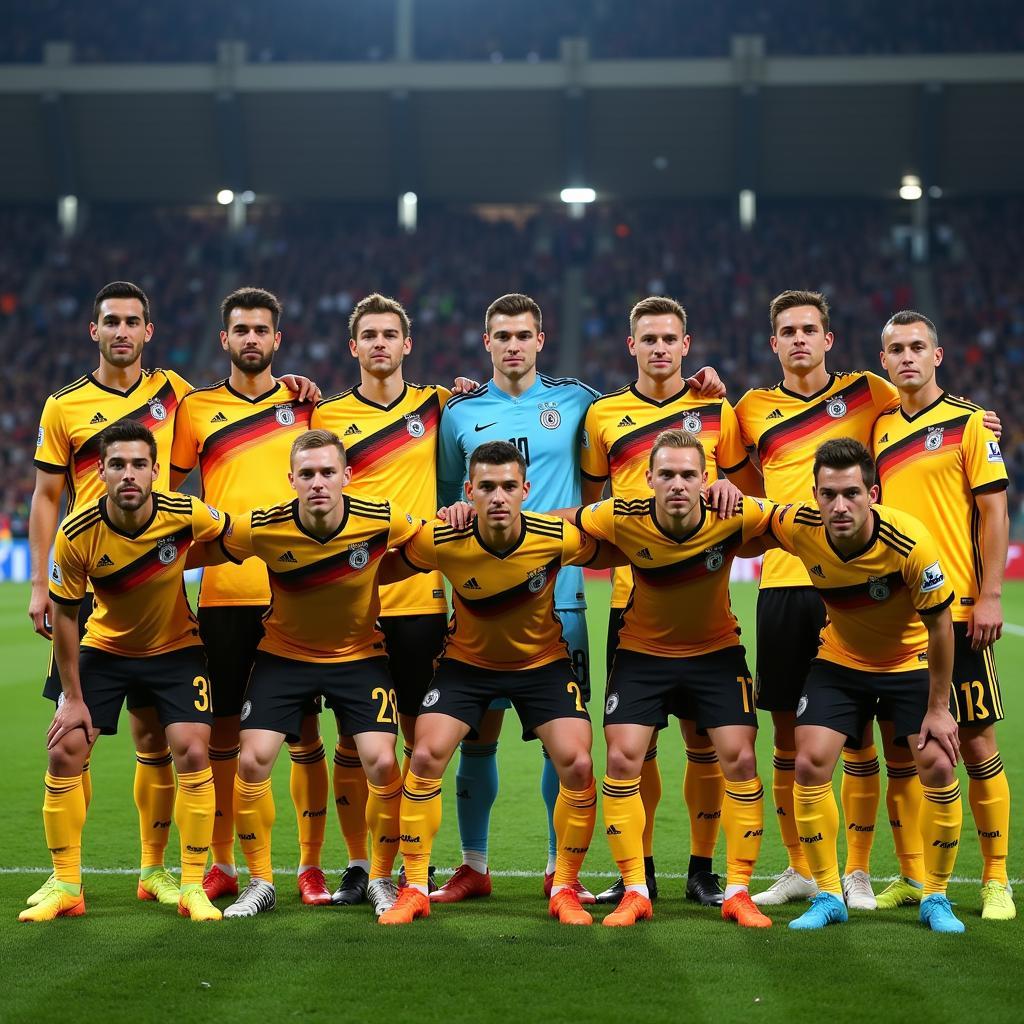Germany’s 2018 World Cup Squad: A Look Back
November 26, 2024The German national team entered the 2018 World Cup in Russia as the reigning champions, boasting a squad brimming with talent and experience. This article delves into the German World Cup squad of 2018, analyzing the players selected and their performance in the tournament.
The German Squad: A Blend of Experience and Youth
Germany’s 2018 World Cup squad featured a mix of seasoned veterans and promising young players. Coach Joachim Löw aimed to balance the experience of players like Manuel Neuer, Mats Hummels, and Toni Kroos with the dynamism of younger talents like Timo Werner and Julian Brandt. The squad was expected to compete for the title, and their group stage opponents – Mexico, Sweden, and South Korea – were viewed as manageable hurdles on their path to glory. Many considered Germany’s 2018 World Cup roster one of the strongest, and rightfully so, given their recent track record and individual player accolades.
Key Players and Their Roles
Several players were crucial to Germany’s World Cup campaign. Manuel Neuer, returning from injury, was the undisputed number one goalkeeper. Mats Hummels and Jerome Boateng anchored the defense, while Toni Kroos orchestrated the midfield. Upfront, Timo Werner led the line, hoping to replicate his impressive club form on the international stage. The team’s success hinged on the performance of these key players and their ability to gel as a unit.
 German National Team at the 2018 FIFA World Cup
German National Team at the 2018 FIFA World Cup
A Shocking Group Stage Exit: What Went Wrong?
Despite the high expectations, Germany’s World Cup campaign ended in disappointment. They suffered a shocking group stage exit, finishing bottom of their group. The loss against Mexico in the opening match set the tone for a disastrous tournament. While they managed a last-gasp victory against Sweden, a defeat to South Korea in the final game sealed their fate. This marked the first time since 1938 that Germany failed to progress beyond the group stage of a World Cup.
Tactical Shortcomings and Lack of Cohesion
Several factors contributed to Germany’s early exit. The team’s tactics appeared outdated and predictable, and they struggled to break down well-organized defenses. The midfield lacked creativity, and the attack often looked blunt. Moreover, the team lacked the cohesion and spirit that had characterized their previous successful campaigns. The defending champions seemed disjointed and unable to perform under pressure.
The Weight of Expectation and Complacency
The pressure of defending their title might have also played a role in Germany’s downfall. The weight of expectation seemed to burden the players, affecting their performance on the pitch. Some analysts also pointed to a sense of complacency within the squad, perhaps a consequence of their recent success.
“The German team arrived in Russia believing their own hype. They underestimated their opponents and paid the price,” says former German international Lothar Matthäus. “They lacked the hunger and desire that had characterized their previous World Cup triumphs.”
Lessons Learned and Looking Ahead
The 2018 World Cup was a harsh lesson for Germany. It exposed the team’s weaknesses and highlighted the need for change. The tournament marked the end of an era for German football, prompting a period of reflection and rebuilding. The team has since undergone significant changes, with new players and a new coaching staff.
“The 2018 World Cup was a painful experience, but it also provided a valuable learning opportunity,” adds Jurgen Klinsmann, another former German international. “The team needs to embrace change and focus on developing a new generation of players who can compete at the highest level.”
Conclusion
The German World Cup squad of 2018 will be remembered for their shocking early exit, a stark contrast to their previous successes. The tournament served as a reminder that even the best teams can falter if they fail to adapt and evolve. While the 2018 World Cup was a disappointment, it also provided the impetus for change and a fresh start for German football. Germany’s 2018 World Cup campaign ultimately serves as a cautionary tale of complacency and the ever-present need for evolution in the dynamic world of football.
FAQ
- Who was the coach of the German national team in the 2018 World Cup? Joachim Löw.
- Who were Germany’s group stage opponents in the 2018 World Cup? Mexico, Sweden, and South Korea.
- When was the last time Germany failed to progress beyond the group stage of a World Cup before 2018? 1938.
- Who was the captain of the German national team in the 2018 World Cup? Manuel Neuer.
- Where was the 2018 World Cup held? Russia.
- Did Germany win any matches in the 2018 World Cup? Yes, they beat Sweden 2-1.
- Why did Germany exit the 2018 World Cup in the group stage? A combination of tactical shortcomings, lack of cohesion, the weight of expectation, and potential complacency.
For further support, please contact us at Phone: 0396443476, Email: [email protected] or visit our office at 23 Tháng 3, Đắk Nia, Gia Nghĩa, Đắk Nông, Việt Nam. We have a 24/7 customer support team.